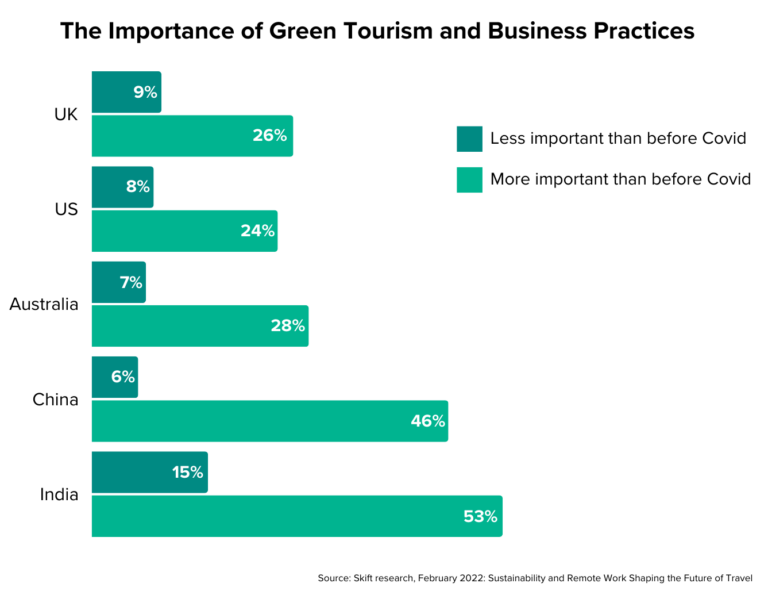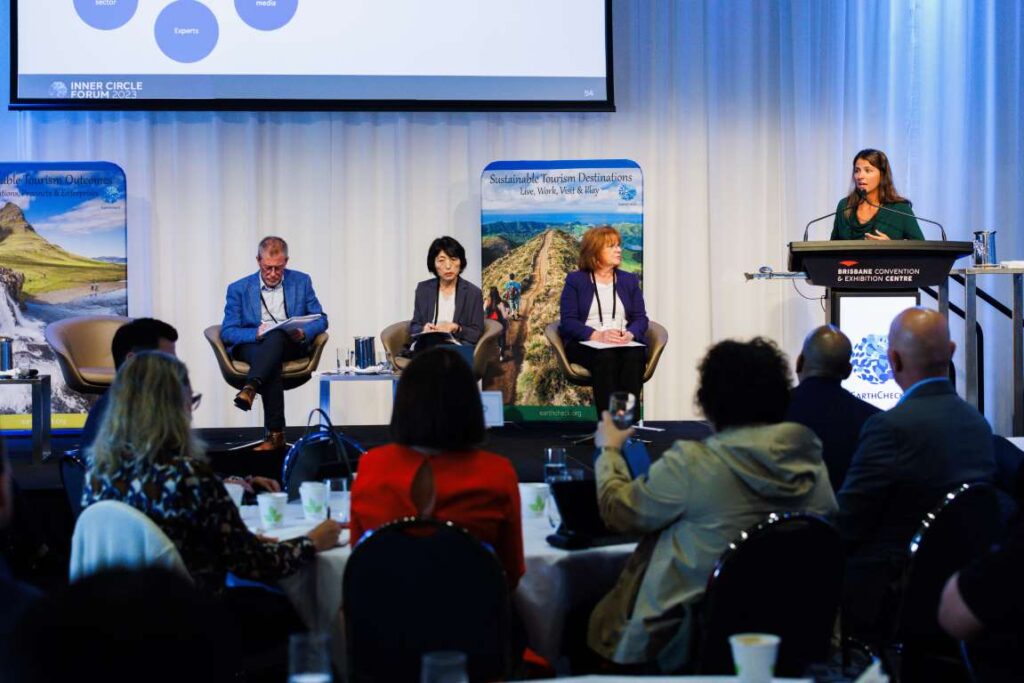
Oliver Batten
Lead – Destination Strategy & Sustainability
Three things to keep in mind - Sustainable Communities, Regenerative Tourism & ESG Reporting
Sustainability is no longer a trend, it is an expectation. Destinations that are consciously putting efforts towards preserving and regenerating our natural environment, and fostering community and culture will be the ones who succeed moving forward.
Storytelling also has a critical role to play and is something that many of us fail to do in a way that resonates with our audience. Stories help us to warn, inspire and create wonder, but it’s easy to feel overwhelmed by sustainability and knowing where to start. While green washing remains to be a real concern, it should not be a deterrent from sharing your pathway to improvement. With honesty and commitment, you can inspire people to follow your sustainability story and take positive action towards a better future.
Sustainability is at the front and centre of the global psyche, shaping demand for low carbon footprint travel options and experiences that touch the earth and its communities lightly, leaving places and people better off than when they arrived. It is increasingly influencing traveller choices in terms of where to go, how to get there, where to stay, and which experiences they engage with at the destination1.
Here is some of the research that supports this:
- 2019 SKIFT Global Forum on The Greening of Travel: ‘The travel and tourism industry need to accept that green business practices will be the next major competitive advantage for brands (and destinations) selling to leisure and business travellers alike.’
- In 2021, Euromonitor International identified only five global trends that will influences how travel would rebound post COVID-19, one of which was that: ‘Responsible and sustainable tourism would be the key in redesigning travel.’
- SKIFT’s 2022 Research Report – Megatrends Defining Travel in 2022 – highlighted that climate resilience is the new Return on Investment in travel and tourism. A point that was further reinforced in their 2023 Megatrends Report.
- Tourism Australia’s 2022 Future of Global Tourism Demand report, states that more than 75% of travellers are committed to sustainability in some way.
- SKIFT’s ‘State of Travel 2023’ report highlights that 69% of respondents are actively seeking sustainable travel options and that 42% paid extra for a more sustainable travel option in the past 12 months.
- It’s important to note that, pricing remains to be one of the biggest challenges to sustainable travel with 25% of respondents perceiving sustainable options to be too expensive.

SUSTAINABLE COMMUNITIES
At the heart of sustainable tourism is sustainable communities. In her presentation at the EarthCheck Inner Circle Forum 2023, Carolina Mendonca, DMO Coordinator for the Azores, commented that communities are at the centre of destinations and it’s important to find out what really matters to them. A thriving and vibrant community is what makes a destination truly special and worth visiting.
See the incredible work The Azores are doing in this space here.
With the above in mind, a key market for any destination is their Visiting Friends and Relatives (VFR) market. Building civic pride and local ambassadors for your destination will not only create vibrancy, but it will also activate residents to invite their friends and family to visit.
“Tourism boards embracing a “locals first” approach post-pandemic is here to stay, as is the imperative of having residents’ input on tourism management to ensure the industry’s future success. That’s because locals will become increasingly engaged in the future of their home, just as travellers will continue to seek sustainable, inclusive options.”
Skift Megatrends 2022
To thrive rather than just survive, destinations will need to develop year-round strategies that actively encourage their resident’s participation in building a strong and sustainable visitor economy.
At DMS we have created a digital marketing solution called ComeVisit! aimed at empowering local communities to take ownership and feel pride in growing the visitor economy by inviting those they trust most. A hyper-local campaign within region activates the community to build the VFR market through the easy to use platform.
Get in touch to discuss ComeVisit with our team or to have a demo of the platform.

REGENERATIVE TOURISM - A step beyond sustainability
In business, sustainability generally refers to doing business without negatively impacting the environment, community, or society as a whole². Whereas the World Economic Forum states that, “Businesses should take a long-term view and become a regenerative business, promoting the restoration and regeneration of natural resources and social systems.”
Globally, there is an increasing concern for the health of our environment. This has been heightened in Australia by recent and significant natural events, such as drought, fires and floods. It is resulting in an increased awareness of sustainability and the impact of climate change (both in general but also in terms of tourism and travel).
Destinations that take a long-term view of leaving places, people and our planet better off than when they arrived will play a critical role in paving the way for the tourism industry.
ENVIRONMENTAL SOCIAL GOVERNANCE (ESG)
ESG reporting has been around for decades, however globally it is being transformed and is becoming much more rigorous. In June 2023, the International Sustainability Standards Board (ISSB) released its new sustainability standards, IFRS S1 General Requirements for Disclosure of Sustainability-related Financial Information and IFRS S2 Climate-related Disclosures.
ASIC Chair, Joe Longo, refers to these standards in a speech at the Committee for Economic Development of Australia (CEDA) State of the Nation conference in June 2023, “Firms should be well advanced in embedding robust corporate governance practices ahead of more rigorous reporting requirements that are imminent in the standards being released by the ISSB”³.
This was further reinforced at the EarthCheck Inner Circle Forum 2023, where ‘ESC and what it really means for me’ was a theme for the conference. It is evident that as stakeholder expectations for transparency in sustainability and climate-related reporting rapidly increases in Australia and worldwide, both businesses and destinations should be preparing for higher standards of ESG reporting.
Sustainable and regenerative tourism plays a key role in destination management and planning. It is also essential for the longevity of our planet.
At DMS, we believe destinations should develop a roadmap towards sustainability that is integrated with their overall Destination Management Plan (DMP) and aligns with other key focus areas such as Community Development, Environment and Corporate Governance.
Please get in touch to discuss this further or to work with our team on building your sustainability roadmap.
¹ Tourism Australia – Future of Global Tourism Demand 2022
² Harvard Business School – What does “sustainability” mean in business
³ ASIC – ESG: Major change is underway, and we need to be ready
Feature Image: Carolina Mendonca, DMO Coordinator Azores presenting at EarthCheck Inner Circle Forum 2023





